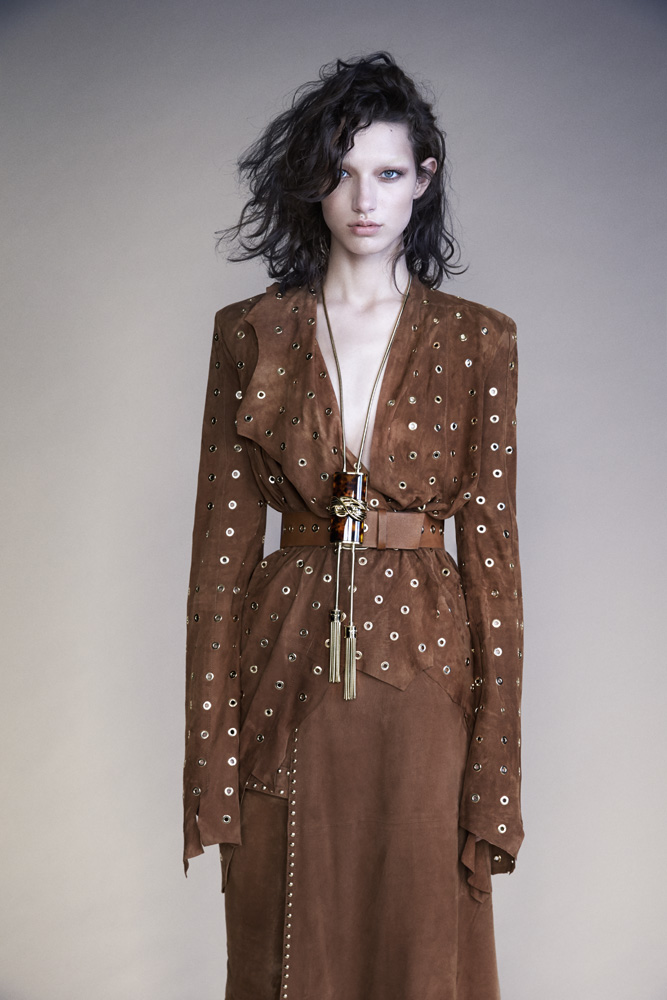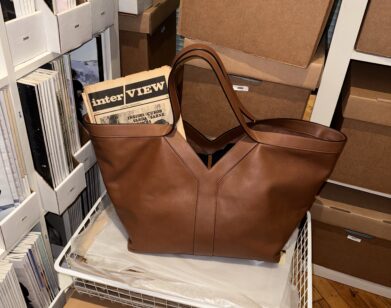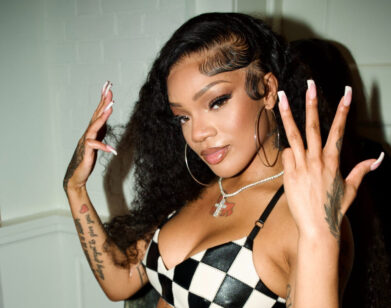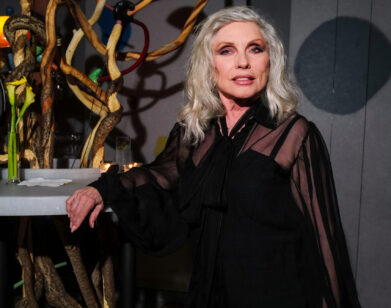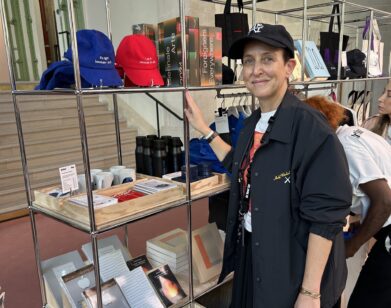Balmain
How can we gauge the success of a fashion designer in the digital age? If we’re going by sales and market shares—or even by those other “shares” and their accompanying likes and followers—Olivier Rousteing, who was made creative director of Balmain at only 25, has, in his six years on the job, been a smashing success. But what of the subtler social impact the designer has had on the culture? No real metric exists to quantify the effect that Rousteing’s #BalmainArmy of fierce women—all storming the runway in martially embroidered mini dresses—has on, say, the aspirations of a young girl following along on Instagram, or on the industry brass, or on the aesthetic of our time.
It seems likely that we are all affected by, even if we’re not participating directly in, Rousteing’s fantasy world. To be fair, he has quite a vivid imagination. From the time he was 10 years old—when he learned that he was not the biological son to the parents with whom he’d grown up in Bordeaux, but had in fact been adopted from an orphanage in Paris—Rousteing began to dream up stories of himself: he was the prince of Egypt, the prince of Brazil, the son of a prostitute. But even as he spun his earliest yarns, he found that there were inherent truths he could not deny. After an attempt at law school, he eventually submitted to his passion for design and went first to Paris to study, and then to Italy, where he worked his way up from an assistant to the right-hand man, first of Peter Dundas at Roberto Cavalli and then of Christophe Decarnin at Balmain.
From the moment he was given the big job at Balmain (and his first collection bumped sales at the house 25 percent), Rousteing seems to have known precisely where he was headed. He has faced no small amount of ire for his early, continual, and full-throated love of pop stars, reality stars, and—euphemism alert—”hip-hop” stars, all of whom he has eagerly incorporated into his vision for the brand.
Just weeks before the opening of Balmain’s new flagship store in Los Angeles this July, Rousteing called to talk about the power, and failings, of Instagram, about the work he is hoping to do, and about the one regret he can’t seem to shake.
OLIVIER ROUSTEING: Finally, a little break. I’m in the middle of fittings. It’s crazy.
CHRIS WALLACE: This is your reality.
ROUSTEING: And my reality goes on until 3 a.m., every night for the next two or three weeks.
WALLACE: It’s funny that you’ve also written, “This is my reality!” on your Instagram bio. I’m starting to think that what we post to our feeds is in fact real life and everything else is just behind-the-scenes. Fittings, late nights spent working—this is what we don’t see on your Instagram.
ROUSTEING: Yeah, that’s what people think my life is, partying in L.A. The reality is I’m not sitting around the pool all day, chilling. Obviously, I’m not going to show my real intimacy. My real intimacy is my work, and to make this whole thing happen, there needs to be substance. I’ve just finished with the Paris Opera [he designed costumes for the ballet Renaissance] and the collaboration with L’Oréal in Cannes [to celebrate the forthcoming Balmain x L’Oréal Paris lipstick collection]. It’s amazing, but it’s also a lot of work. That’s why I’m always running late.
WALLACE: Maybe it’s because of Instagram, but I have a hard time picturing you locked away in some lonely garret. What is your process like? Are you always surrounded by people?
ROUSTEING: I actually am locked away. I think I have 4.6 million Instagram followers, which is obviously a great way to communicate my work and my life. But it’s also a form of protection, because I don’t want everybody to see my process. What I want to share in the pictures I post is something dreamier than reality. I love solitude. I love escaping into my mind and sketching. Sometimes I travel alone. I’m the first one at the office in the morning, the last one closing the door. People don’t expect that, because on Instagram I have a reputation as a party boy who takes selfies all day.
WALLACE: I think you anticipated something about the way that the projection of image, of fantasy, has come to dominate our culture, and because you were there early, you faced some criticism for it.
ROUSTEING: When I was starting my Instagram, a lot of people on my team were really scared. Like, “How can you be popular while selling clothes for more than 3,000 euros?” But when you become controversial, when you want to promote new ideas, you need to be the face of it and not be scared. That’s why I decided not to hide on my Instagram, but it has not been an easy process. As a public figure, there are a lot of people who love you, and so many who hate you. I really respect the new generation, people who are maybe 12 or 13. I think it’s really important to understand the future customer—their tastes and their dreams. What my generation is dreaming of is different from what my parents dreamt.
WALLACE: Speaking of which, I’m curious about the moment when you were 10 or 11, when you first learned that you had been adopted. You’ve said that you created fantasies of where you might have been from, these possible versions of your history. That seems like such a powerful, scary, even liberating thing—and one which fashion seems to have helped you address.
ROUSTEING: I’m always trying to understand who I want to be, what I want, what I dream of. When I was a kid, I was really worried that my parents were going to bring me back to the orphanage. I was scared of tomorrow, scared that I was going to be abandoned again. So I tried to enjoy every minute of my life because maybe tomorrow wasn’t going to happen. I think I live the same way today: scared of tomorrow. For someone who is considered a party boy, a guy who just has fun and drinks champagne, I’m really tortured.
WALLACE: It must be validating, then, to have your Balmain Army.
ROUSTEING: I’ll tell you exactly how it started, that hashtag and name. When I became the creative director of Balmain, I was a really nice kid, a pretty boy following the rules. You’re taught that you need to please magazines, to please the fashion elite, and that if you do everything the right way, everyone is going to love you. But I decided not to follow some of the rules. My girls from the runway were not just models—they were soldiers. They helped me bring my ideas to life. I was talking about sexiness, about diversity, about different shapes of bodies. I was following my instincts and learning that it would not please the fashion elite. And I think this is the real luxury, to be free to express yourself. Freedom is luxury to me. So I started to build my Balmain Army. And I have to tell you, I wake up every morning and feel really proud to look in the mirror and say, “I’m satisfied with what I’m doing.”
WALLACE: What’s missing?
ROUSTEING: I’m so happy with the freedom Balmain has given me to express myself. There aren’t many brands that would give a designer that chance. It’s really sad to me that we even have to talk about diversity in the fashion world today. That I would love to change. Diversity should be normal.
WALLACE: What have you learned about yourself during your time at Balmain?
ROUSTEING: I’ve learned that I am strong enough. When some people might have given up, I didn’t. I found myself in situations where I had to make choices and I followed my instincts. You can’t show people you’re learning, because if you do, they will treat you like a kid. You have to grow up faster, not showing any fragility.
WALLACE: Do you think about the other Olivier, the Olivier you might have become if this hadn’t all happened to you?
ROUSTEING: I have sacrificed many things, for sure.
WALLACE: It’s got to be hard on relationships.
ROUSTEING: It’s the hardest on relationships because, first, you don’t have any time, and second, when you build a big empire, you become the persona that people think they know. So when you try to show them who you are, to help them discover you, they just want what they think they know about you. I would have been smarter to build some relationships when I was younger, a private love or something. Today it is more difficult. But it’s the price to pay. I never regret anything, because every choice I made for a reason, but I’d love personal love. [laughs] I have so much love coming from my friends and from my team and from my business … But it’s true that maybe personal love is my biggest regret.
WALLACE: Well, it’s a long life, and you do have this passionate, supportive group of people around you.
ROUSTEING: It’s tricky because Instagram is not Grindr. [both laugh] I’m always trying to show my good side. I never complain. When I have a moment of sadness, I make sure no one ever sees. And while I’m so good at talking to friends or talking about my job, if you were to ask me to dinner—just the two of us, in a romantic way—I would be the worst. I’m so shy I would not talk.
WALLACE: Are you the person that your friends go to for advice?
ROUSTEING: Yeah.
WALLACE: And are you good at giving it?
ROUSTEING: [laughs] I hope so. Even if I’m the youngest in the group, I’m the one taking care of everybody. I’m always in control, which means that I can see what everyone around me is doing, what they’re going to do. At the end of the day, I make sure to never let go of that control.
WALLACE: You’re always on duty.
ROUSTEING: My friends know that they can call me at one in the morning when I’m in my bed and before I go to sleep. My dad does as well. When he wants to talk about his girlfriend, he’ll call me in bed, and I’ll speak to him for half an hour, an hour. And then, at some point, I finally go to sleep.
CHRIS WALLACE IS INTERVIEW’S EXECUTIVE EDITOR.

